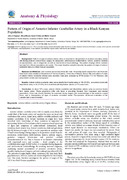| dc.description.abstract | Background: Pattern of origin of anterior inferior artery is important in interpretation of posterior circulatory stroke
and during posterior cranial fossa surgery for aneurysms, arteriovenous malformations, tumors, posterior cerebral
revascularization, and in diagnostic as well as interventional neuroradiology. The pattern displays ethnic variation
but data from African populations are scanty. This study therefore aimed to describe the pattern of origin of anterior
cerebellar artery in a black Kenyan population.
Materials and Methods: One hundred and seventy three [99 male: 74 female] basilar arteries from adult formalin
fixed brains were studied at Department of Human Anatomy, University of Nairobi, Kenya. Site and pattern of origin
of anterior inferior cerebellar arteries were recorded. Data were analyzed by SPSS version 17.0 for Windows, and
presented in a table and macrographs.
Results: Anterior inferior cerebellar artery arose directly from basilar artery in 138 (79.8%), as common trunk with
labyrinthine artery in 24 (13.9%), from verterbral and labyrinthine arteries in 3% cases each.
Conclusion: In about 14% cases, anterior inferior cerebellar and labyrinthine arteries arise as common trunks
from basilar artery. These proportions differ with those in prevailing literature from Caucasian and oriental
populations. Extra care should therefore be exercised during surgery and neuroradiology in the posterior cranial
fossa, and in interpretation of signs of posterior circulation stroke. Pre-operative ultrasound evaluation of the
vascular bed is recommended. | en_US |

